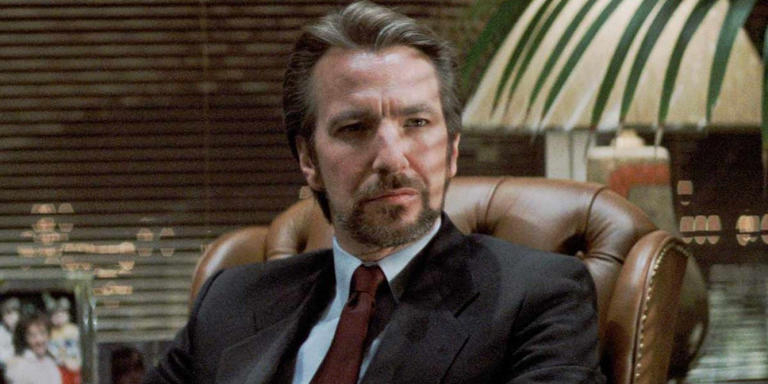Alan Rickman: how to create a villain
Radio
Program: “Prime Time”, a regular program on Radio Canada
Date of broadcast: December 23, 1991
Guest in the studio: Alan Rickman
Interviewer: Geoff Pevere, Canadian film critic, radio journalist, author
Duration: 14 minutes 49 seconds
Below is a transcription of this audio interview.
Alan Rickman began his career on the stage with the Royal Shakespeare Company in England, but most North American audiences probably know Alan Rickman from Decadently overwrought, villainous film roles like Die Hard and Robin Hood Prince of Thieves.
Audio insert:
Hans Gruber (Alan Rickman): You know my name, but who are you? Just another American who saw too many movies as a child. Another orphan of a bankrupt culture who thinks he’s John Wayne. Rambo. Marshal Dillon Crow. This time, John Wayne does not walk off into the sunset with Grace Kelly.
John McClane (Bruce Willis): It was Gary Cooper, asshole.
Sheriff of Nottingham (Alan Rickman): Robin hood steals money from my pocket, forcing me to hurt the public. And they love him for it.
Monk: Yes.
Sheriff of Nottingham (Alan Rickman): That’s it. Cancel the kitchen scraps for lepers and orphans. No more merciful beheadings and call off Christmas.
In Hollywood, Alan Rickman has made a career out of playing flamboyant villains. But in two recent British films, Truly Madly Deeply and the soon to be released Close My Eyes, he plays the kind of complex roles he was trained for in the theatre.
Geoff Pevere: Alan Rickman joins me now in the studio. Hi, Alan.
Alan Rickman: Hello.
GP: Can you tell me what it was that attracted you to the stage initially?
AR: Oh, I don’t know. It’s something that you fight off for as long as possible or sometimes. I mean, maybe some people go straight towards it, but I. I was fending it off for a long time, although I think I think there’s a kind of inevitability, probably about doing something like acting or singing or dancing or any of those crafts or arts or whatever word it is that you apply. And so it took me a while. There were other things that got in the way, but I think I probably knew that I would act from the time that I was a child.
GP: And can you tell me? I know that? I mean, it’s probably difficult to boil down, Alan, but what is it that one learns, for the most part in drama school that is most useful to an actor?
AR: Hopefully you learn about yourself. I was very reluctant to go to drama school because I thought, well, you know, this whole technique thing, they’ll stick all sorts of things onto me, and I won’t be me, and I’ll be like a sausage in a sausage factory, you know, putting out so many actors. Of course, the reverse is true. And technique, such as it is, is not an imposition. It’s something that frees you up so that you can hopefully move off in any direction. It’s not. This is how I speak. This is how I move. This is my style. It’s just in a way, you understand what you get to know, what your own bad habits are, the things that get in the way of your imagination. And so that, I think, is what technique is about. It’s about getting rid of your own bad habits so that your imagination can actually produce tangibly what’s going on in your head when you read a script.
GP: And is that a process that is restricted to drama school, or is that also something you refine once you graduate and become a professional actor?
AR: Oh, I think a lot of the best lessons that you get from drama school, you don’t realise until like ten years later, you’re in the middle of a rehearsal room, you go, oh, I see, that’s what she was talking about. You can’t, you know, it’s not it’s not a cramming factory. You just have to stay as open as possible while you’re there and make as many mistakes as possible. Be as bad as you possibly can be, and and you will. And and it gives you some armoury for the years ahead, I think.
GP: Why were you attracted to stage work? You worked on the stage for a long time before you made films.
AR: Well, we don’t have a film industry, so you don’t have any choice in the matter, frankly. So you don’t really think in any other terms. You just you just assume that’s what you’re going to do, and maybe you’ll do some television if you’re lucky, and an occasional movie might just happen along. But no, I mean, these two films are little miracles, really. The British film industry saying, I’m still here. I can still do it. Will somebody please invest in me? Will a government come along and decide that it’s common sense to invest in me? Because, you know, there’s a big returns that could come back here, but so far they haven’t made that little mental leap.
GP: And how does someone find themselves making the leap from there to Hollywood in a movie like Die Hard? What were you doing at the time that you got that offer? And how did it come your way?
AR: Well, I suppose my theater work culminated in going back to the RSC in 1985 with Juliet Stevenson. In fact, we were in the company together there, and we both were in the we both did the first production of Les Liaisons Dangereuses together. She left it after a year. I took it in on into the West End and then to Broadway. And there you go. I mean, it was on Broadway. It was a huge success. And the producer of Die Hard was brought to see it. And then when I went out to Hollywood at the end of the Broadway run just to say hello, and this is me, and I’m here for a couple of weeks. It’s one of those stories that you think only happens in in comic books. Really? I was there two days and they asked me to do Die Hard. And again, they caught me at the right time. I’d just done this show for eight times a week for on and off for two years. And it’s like banging your head against a brick wall. It’s wonderful when you stop. And stopping was doing Die Hard. In a sense. It was. It was an opportunity to go to Los Angeles. The child in you comes out because it’s a big movie and you’re in Hollywood, and it’s playtime and you don’t have to do it every night. You get some days off and the sun is shining.
GP: You you seem to be having an enormous amount of fun in that film. Were you when you were making it? Yes.
AR: Of course. Yeah. I hadn’t ever made a film before, you know? I mean, I was like a child in F.a.o. Schwarz. It. Was Yes, it was great fun because I could be. It was sort of irresponsible again, you know, and and as it turns out, it was risky. You know, you’re seeing all this violence and mayhem going on and you’re thinking, oh my God, what am I in? But actually, as it turns out, I think it’s a it’s a really great film. It’s really well made. It’s and it’s quite subversive in its way, you know. Okay, there’s only one there’s a guy, a token female. But but she’s running the thing. The black characters are all very intelligent and positive. They might also be not exactly on the side of right and the law, but yeah, but they’re not stupid and they’re not caricatured and and in subtle ways that film fights a few battles.
GP: And as that was your first film experience, were you able to draw upon any of your theatrical background to round out the character of Hans, or did you feel that it was in any way necessary, given the new context in which you were working?
AR: I guess you try to make, you know, one’s training tries to you try you try to make characters as real as possible, as three dimensional as possible, given that it’s a pretty two dimensional kind of a movie and that it’s not, it’s we don’t want to know about the inner workings of his psyche, which know whether he’s going to get away with it or not. Really. And and is he interesting? And do we want to watch him? And is he the right sort of bookend to Bruce Willis? So that’s the job is to, you know, make another bookend. So I was able to influence the character actually, to quite a large extent because of a logic that I applied, I suppose, and then asked questions and forced the logic through you know, like, why is he why have you got him dressed in terrorist gear when he doesn’t get his hands dirty, and he’s got all these people around to do the mucky stuff. So eventually I got a suit and and that was the right bookend to Bruce, because he was going to be in a t shirt and sweat. And then once one was in a suit, it became possible to push the notion that they should meet. If I’d been dressed in terrorist gear, we wouldn’t have had the scene where we met and I pretended to be one of my own hostages. So that influenced the film quite directly.
JP: Are there different demands that are placed on you as an actor in Hollywood than the demands that are placed on you as a stage actor in Britain?
AR: I’m probably externally, although they still want you to come up with the goods. And I guess they’d better be there in rushes. Otherwise, there’s an awful lot of money riding on a big Hollywood movie. And I think although people wear very expensive suits and look very confident. They still need to see it in rushes and whatever it is is pretty undefinable. I think this marriage between a script actors and a director, it’s something that producers in Hollywood and the executives like to think they understand. But I think a lot of the time they’ve got their fingers crossed. Because you get proved wrong so often. You know, they’ll put what they call box office names in a project and it bombs. I would like to see far more examples of truly, madly, deeply is coming along and being successful in Hollywood against all the odds. You know, Baghdad cafes and pictures like that. Because then Hollywood can help to prove that people need to be told stories rather than be manipulated Populated by greedy individuals.
GP: And why do you suppose, Alan, that that kind of storytelling happens so seldom in Hollywood?
AR: Well, because, you know, something like Die Hard and Robin Hood to a certain to a certain extent, they’re written to formulas and they’re very much about making money back. They cost a lot of money to make. They’ve got to make the money back. So therefore there are certain requirements and ingredients that they figure should be there with Truly, madly, deeply and Close my eyes, their complete personal vision of the writer director. You know, all there was was a blank piece of paper in a typewriter somewhere down the line that gets turned into a movie. Nobody got in the way. Nobody else’s vision.
GP: How do you imagine those films might have been made differently if they had been made in Hollywood? Or would they have even been made in Hollywood?
AR: Well, I suppose a lot of people have said, oh, well, it’s the thinking person’s Ghost. Truly, madly, deeply. And I think they’re very different films, and I don’t think it doesn’t really help. It doesn’t really hurt to compare them. You know, if you enjoyed Ghost, you will enjoy Truly, madly, deeply. If you didn’t enjoy Ghost, you will enjoy Truly, madly, deeply.
GP: I see.
AR: But they, you know, Hollywood is very different from the miniseries world. It’s the thing that always amazes me about, you know, what you can do on television and how careful they are and this, that and the other and, and and actually Hollywood will you know, it’s got Scorsese and it’s got Coppola and it’s got some great, great filmmakers who have very daring. You think of a film like Taxi Driver and you think, well, how much more daring do you want? How much more on the edge do you want? They’re perfectly capable of doing it and keep doing it. If but then again you see what you have is filmmakers who are not interfered with. It’s the the problem arises when there are too many opinions from too many people in suits and opinions is all they have.
GP: Yeah.
AR: And so the film gets diluted. So if you had a film about incest being done with, you know, 5 or 6 producers, it’s going to be fit for the top of a chocolate box by the time they’ve finished.
GP: Yeah. And I wonder, how do you foresee your future involvement with Hollywood? You have maintained your work on the stage. You are making films in Britain. Can you imagine what your future relationship with Hollywood will be?
AR: Well, I hope it continues. I’ve got absolutely no qualms whatsoever about entertaining the public. You know, I think that’s fine. People don’t need to be lectured at all the time. I hope they tell good stories, and I hope that even within a big budget cartoon movie, I’m not sure that I’m going to do any more of those. But if I were, I hope that it’s possible to be subversive within them, just to gently pull the rug out from people’s preconceptions and make them kind of just look at the screen from a slightly different angle. And if you can, you know, it’s a huge responsibility and power to do that to millions and millions and millions of people, rather than just in an arthouse cinema. I’m not saying one is better than the other, but that big one exists. And so let’s put it in the hands of a few subversives, is what I think.
GP: Joining me in the studio this evening has been actor Alan Rickman. His films include Die Hard, Robin Hood: Prince of Thieves, Close My Eyes, Closet Land, and Truly, Madly, Deeply. Alan, thank you very much.
AR: Thank you.



